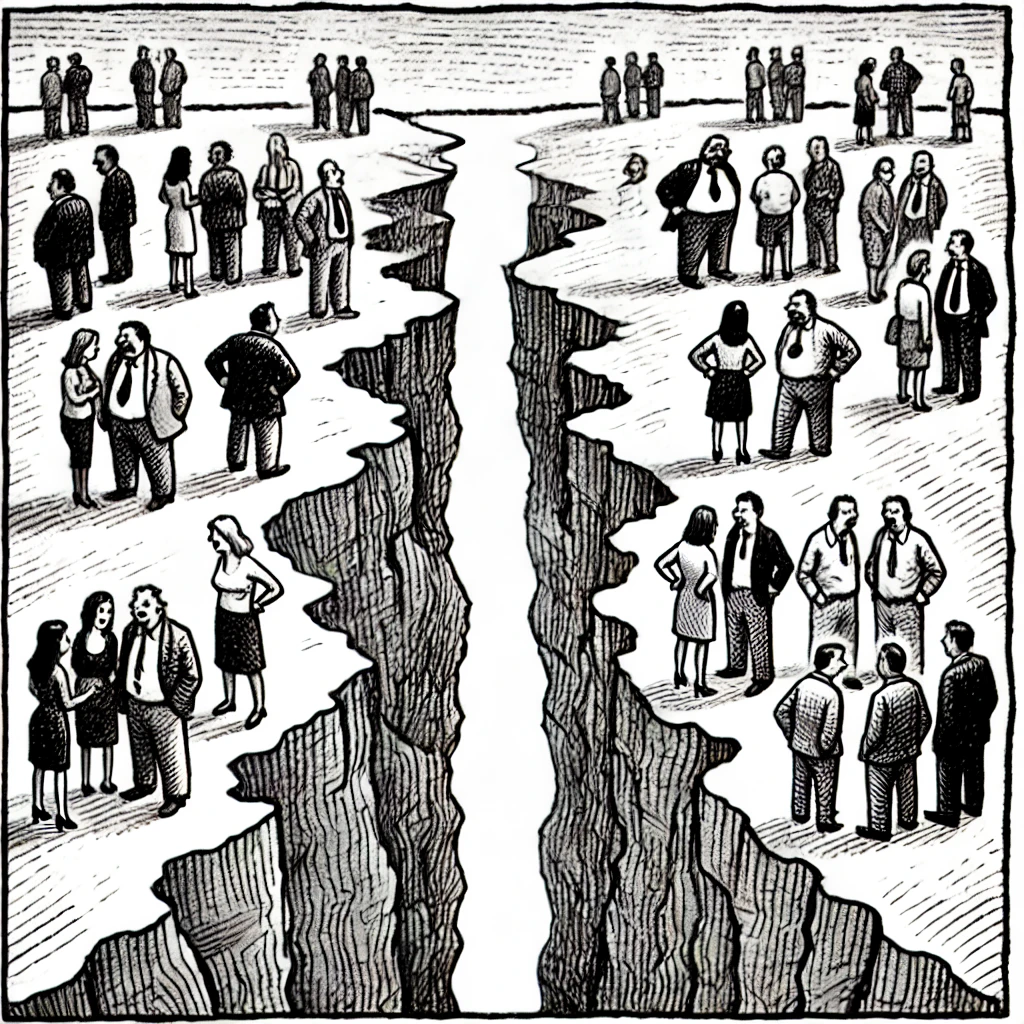
How Avoidance of Solutions Fuels the Israeli-Palestinian Stalemate
The Israeli-Palestinian conflict has left deep scars on the American social fabric, wounds that fester because they are rarely addressed head-on. Conversations are avoided, and the fear keeps people silent. The damage remains because the very act of trying to mend it threatens to tear the rift even wider. America’s unwavering financial and military support for Israel implicates all Americans in the unfolding tragedy. This moral quandary is inescapable, whether one is Jewish, Arab, or otherwise.
There is a perverse comfort in the vastness of these divides. The chasm between opposing sides is so wide that the other side is barely visible. Each side can safely vent their anger to release their tension without engaging the other side meaningfully. The act of venting has become a form of catharsis, a way to bond with others over shared grievances.
Venting is an expression of helplessness; you vent when you feel you can not solve the problem you are facing. Venting and complaining are enjoyable because they offer relief from tension, even if the tension was built from unrelated causes. Commiserating and bonding are also pleasurable because they widen and deepen friendships. When these types of enjoyment are prioritized, there is no incentive to solve the real problem because the enjoyment will stop if it is solved. The status quo becomes the unconscious goal.
Deep down, most people recognize that a two-state solution is increasingly implausible, yet the debate continues as if it’s still on the table. Both sides seem to harbor unspoken desires that the other would simply disappear from the region. The grim reality is that such an outcome would amount to ethnic cleansing at best, genocide at worst—terms frequently hurled at the other side, yet rarely reflected upon when considering one’s own position.
For Israel, the best-case scenario might involve the continued expansion of illegal settlements, making Palestinian life so unbearable that they slowly leave on their own accord. This gradual takeover of historic Palestine could then proceed without integrating Palestinians and granting voting rights.
For Palestinians, the ideal outcome would see the United States withdraw its support for Israel. Without American backing, Israel’s role as a regional proxy would collapse, leading to a cascade of Arab nations turning against it. In this scenario, Israel might crumble under the sheer weight of its Arab neighbors, resulting in a catastrophic refugee crisis in Europe—a second Holocaust, some might say. The phrase “from the river to the sea” becomes chillingly real under such circumstances.
Yet, these goals remain unspoken. Both sides shy away from acknowledging the full implications of their desires because the consequences are too abhorrent to contemplate. Instead, they pass the burden of finding a solution onto someone else, avoiding the cognitive load of research, theorizing, and face-to-face negotiations.
Without a clear solution in mind, venting frustration achieves little, and may even worsen the situation by hardening positions and closing off potential avenues for resolution. Most people haven’t even begun to imagine what a viable solution could look like. Consider, for example, this proposal by Jonathan Kuttab, a human rights attorney. Reading through any proposed solution underscores its fragility, its naiveté. But this is only because any solution requires both sides to meet halfway, not because the solutions themselves are naive. Without meeting halfway, ethnic cleansing of one side or the other is inevitable. From this perspective, we see a different division emerge: pro-solution and anti-solution.
Despite the countless social media posts about the conflict, most people only see what’s within their own echo chambers. Social media algorithms are adept at keeping these bubbles intact, giving users the illusion that they are being heard when, in fact, they are only shouting into the void. This isolation makes venting more enjoyable, but it also makes resolution increasingly unlikely.
The prospect of discussing solutions can feel intimidating. Without a Ph.D. in political science, Middle Eastern history, or international law, what can an ordinary person contribute? But this sense of helplessness is precisely why venting has become so widespread. The truth is, we don’t need superheroes—we just need more people to be informed. The goal should be to learn and share that knowledge with others, gradually expanding the circle of those who understand the complexities of the issue. In that process, we can heal the scars even though it may be painful at first.
If you are interested in discussing solutions, please reach out to me.
Subscribe
I will email you when I post a new article.


